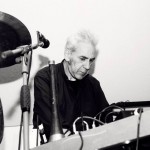 John Murphy is one of the few pioneers of industrial who have remained loyal to the music they have invented over the decades. And that has to be emphasized in Murphy’s case, because he is a very versatile musician, who usually works in parallel with several work and has done some changes and developments. John has been a renowned drummer since the 70s, and at the latest since his time at SPK, the electronic processing of sounds is his second mainstay, and perhaps the most interesting projects have always been the ones in which he brings both skills together. Murphy took an active part in the punk movement in Australia in the late 1970s and came straight to the emerging industrial music. Later, after a first time in Europe, he played as a drummer with some commercially successful rock and pop acts like Max Q. Interestingly, these works today also find their echo in his live drumming in numerous folk groups. For several years now, Murphy has been concentrating on his own band projects, and in recent years there have been many recordings and concerts with acts like Krank, The Grimsel Path, The Walking Corpses and especially Last Dominion Lost, of which soon a concert recording with exclusive material will be released. These activities and their backgrounds are at the heart of this interview we recently conducted with Murphy. John’s difficult health condition is also discussed. On the day of our meeting he was, despite everything, a very cheerful and friendly host, which is also reflected in the interview. At this point, we also want to send our best wishes to John, his wife Annie and all close relatives and friends.
John Murphy is one of the few pioneers of industrial who have remained loyal to the music they have invented over the decades. And that has to be emphasized in Murphy’s case, because he is a very versatile musician, who usually works in parallel with several work and has done some changes and developments. John has been a renowned drummer since the 70s, and at the latest since his time at SPK, the electronic processing of sounds is his second mainstay, and perhaps the most interesting projects have always been the ones in which he brings both skills together. Murphy took an active part in the punk movement in Australia in the late 1970s and came straight to the emerging industrial music. Later, after a first time in Europe, he played as a drummer with some commercially successful rock and pop acts like Max Q. Interestingly, these works today also find their echo in his live drumming in numerous folk groups. For several years now, Murphy has been concentrating on his own band projects, and in recent years there have been many recordings and concerts with acts like Krank, The Grimsel Path, The Walking Corpses and especially Last Dominion Lost, of which soon a concert recording with exclusive material will be released. These activities and their backgrounds are at the heart of this interview we recently conducted with Murphy. John’s difficult health condition is also discussed. On the day of our meeting he was, despite everything, a very cheerful and friendly host, which is also reflected in the interview. At this point, we also want to send our best wishes to John, his wife Annie and all close relatives and friends.
John, over the last decades you have been both an observer and a participant of (for lack of a better term) “industrial culture“. What can you tell us about major developments/changes/seismic shifts that you have witnessed/contributed to?
Well that’s a hell of a lot more varied now, many different subgenres came up. Various things considered in the early days turned into power electronics, where everyone was copying Whitehouse, and they always had something about serial killers and things like that. I could be wrong about this but I think that’s not so prevalent anymore.
Sort of a dead end street..
Yes, its aways the same subjects, a dead end street, it just got boring. And there’s a lot of more humour today, which is important, a lot of stuff back then was completely humourless. Done by people who obviously had psychological problems in the real world. One or two people in the early days like Cabaret Voltaire or Throbbing Gristle had a lot of humour, but it seemed to be lost and the people who followed on, at least a lot of them, missed the humour. Especially acts in Northern Europe, who don’t understand the British irony, the bizarre English humour which also happens in Australia. So they missed that and they took all this stuff and just got boring. Jon Evans is the best person to talk about that, we had often discussed this. It just got tedious, a lot of people were tedious people in the real world. One-dimensional and always talking about dark, black subjects. Maybe it was a cultural thing, but some day it just wasn’t there any more.
Was there ever a time when you thought you would lose contact to that scene?
Yeah, well I did sort of a bit when I was in Australia in the mid-eighties. I did a lot of commercial work with my drumming abilities, but I never entirely gave it up, I did think of that occasionally. Many people back then said „you’re a great drummer, you’re wasting your time doing this noisy crap“, but there was a part in me that still wanted to do it. I didn’t get much encouragement back then, quite the reverse actually, I got the ridicule of peole, but I said „I don’t care what you think, I don’t give fuck, so if you don’t like it there must be something good about it“, you know… I always kept my hand in, even though I knew there was little possibility of success there, I didn’t even consider that. I thought internationally, and that was well before the internet. I had stuff out on a label called Extreme Records, who mainly dictributed overseas, mainly cassettes.
Kraang and other stuff…
Yeah, Kraang and some live performances, and the other thing called Shining Vril, the very early Shining Vril that had two different other names, I could never work out which one to call. The one was My Father Of Serpents. It was like a proto dark ambient ritual thing. And then I also sometimes called that Ophiolateria, which is an old word for Serpent Worship, I had cassettes put out under that name, by Ülex Xane, who does Streicher and ran Extreme for many years. And still does, I knew him quite well. We were hard pressed to get 20 people who liked industrial music in Melbourne. At the time, I sold out the Orchestra Of Skin And Bone which I had with someone else. A sort of avantgarde post punk thing, I thought that was peculiar.
What do you think is the role of industrial music today, after each and every taboo imaginable has been broken and can be found as subject in one of the ubiquitous talkshows? It seems that it’s no longer necessary to lead an “information war“ concering deviant sexuality etc.
It’s just another form of music today. Well that’s my opinion, it’s not in the vanguard of music as it was in the late seventies, when Throbbing Gristle were active.
Just another pop genre…
Well to be honest to you, yes. Cause it doesn’t effect gereral culture anymore, it’s very different from forms of subcultures nowadays, join THEM, well…
Somehow accepted and at the same time ignored by media.
Yes, exactly, it’s nothing really you can shock them with, it’s just accepted with earplugs. When you’re doing something for shock, take something else, but probably not music. It’s just another sort of entertainment section. It’s another era especially in electronic music, there are hundreds of different gernes nowadays. Industrial became known as one of the fathers of it, but it’s not that relevant to most electronic music makers now, it’s part of history, it’s not considered. I mean there’s still people who do industrial music, but for the outside world it’s just not very important.
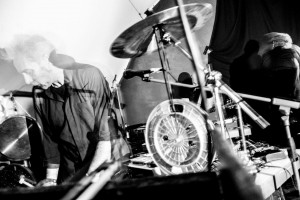 I recently thought that if one were to name one key element that chararcterizes the bands/projects in which you are or were a key part then I would say that there’s some ritual element in them. Would you agree?
I recently thought that if one were to name one key element that chararcterizes the bands/projects in which you are or were a key part then I would say that there’s some ritual element in them. Would you agree?
Most of them, yeah. Maybe not all, I have done rock projects with people mainly in Australia, which probably didn’t have that, but most of my stuff in the more experimental area has a tinge of ritualism in it. I can’t give you an answer why. It just appears. I never were really into EBM and stuff, and I’m just more free flowing, like in a free flowing jazz band, you know, where a third voice speaks trough you. It’s something that just happens.
You don’t prepare this or think much about it..
Yeah, maybe sometimes, but it depends on what project it is, I don’t approach everything in the same way. Like either in recording or in live work, it just really depends. Whom I’m working with is of vital importance.
Are you fascinated by the the technical side of music, or is this more something necessary, that one has to master?
Well I havn’t really mastered it… I don’t find it that fascinating and I don’t believe that it’s a neccessity, but I think it helps a lot. Depends on what you’re doing, you know. If you’re doing largely accoustic or jazz then it’s not so important, if you use a laptop. I have no objection to computers and electronic devices, I like doing it, but im not a passionate enthusiast about it. I do believe a lot of people do music that way, and a lot of them suffer from adult autism. That’s just my observation of various people’s charakters. They’re obviosly people who in the past could never have played in a group, cause they don’t know how to interact with other people. So a laptop or any sort of computer technology helps them make their experience and realize their goals. I have no objection towards using computer technology along with other things, my only objection is to go to a show and see someone sitting behind a laptop or computer. Usually they got some interesting light shows but all they do is playing a midi keyboard or clicking on some buttons.
Like in an office room.
Yes, somehow, it’s really not doing it for me. For me these are prople who wouldn’t dream of performing, being on a stage, twenty years ago or something, pre internet age. Now they can do it, its good and its bad at the same time.
You’ve been living in Berlin for quite a while now. What makes this city such a good place for artists?
Cheapness first, yeah. Nice atmosphere, well, and relatively safe. And quite a good creative vibe in general. And I got a community here I can work with and get along with pretty well. That helps. And London is another good place with good vibes, except it’s very expensive. Berlin is probably the cheapest city in Europe, and for someone with a limited income like myself it’s a God send, well. I wouldn’t live in Copenhagen for instance.
So even in London it’s more difficult to organize concerts.
Well that’s another thing. It didn’t use to be. So in the late nineties and early 2000s it wasn’t too difficult, but now its increasingly more difficult, there’s thousands of historical places of alternative London being gentrified and closed down, and the venues don’t exist anymore. So they use warehouses now, still difficult…
Also the audience is smaller to a certain extent.
Well I actually havn’t been there to a show for some time. I went to one there last year as I was briefly there. It seemed an enthusiastic crowd, but yeah, there wasn’t that many people.
You lived in different cities over the years. Would it have been possible for you to create your music outside an urban environment? Not necessarily just because of a lack of venues, people, networks etc. but also because of a more genereal sense of atmosphere.
Well, that would depend on the era and essencially when it was. Woudn’t be able to do much when living in Australia in a country town. Now it’s possible maybe with laptops and stuff. But then again it would be pointless, you could do it, but worrying about the locals. So twenty years ago, pre internet, you could think about these things going into a music store to get samples and stuff, but just the basics would be a lot harder. And that would deterr a lot of people. When I grew up, and Jon Evans and Julian of Last Dominion Lost would attest this, we grew up with something called a „cultural cringe“, which is a bit hard to explain to Europeans. Essentially there is a believe that everything cultural from Europe is far superior to what we did locally, no matter what it was, art, film, music. In some years this would maybe go down and then reappear as some sort of an arrogance. But even with the internet it’s still there in the background, people would still not believe that it’s good what they’re doing. Some will now, because they’re connected up with likeminded people, but you’re still surprised how many people will just not believe you, when you say „look, you’re a fantastic musician, why don’t you connect up with this person overseas or this bunch of websites.“ They seem to think that because they are Australian, it’s an inferiority complex, maybe it comes back from the fact that we come from convicts, I don’t know. We have often wondered about this, why this mentality exists and it hasn’t gone away, or only a bit with the avenge of the internet.
But couldn’t it also have to do with the quantity, for instance in the late seventies, as industral and punk music came up, more things happed earlier for instance in the UK?
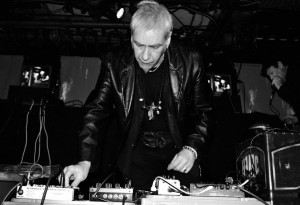 Yes, this is also the case. It started off there. But sometimes things call on quite quick. Well, there was an industrial scene in Australia in 78/89, SPK were the main one and the band I was in, Whirlywirld, sort of Tuxedomoon meets Cabaret Voltaire, but with Bowie influence as well. Quite early on we knew we would never get anywhere with this there, just because of the set-up of the cultural and music industry in particular. You had to get over this and go overseas, or you fell down, broke up. A lot of these people didn’t get overseas and ended up with a lot of drug abuse, it went very negative, drugs and alcohol, a massive amount of that. But yeah, the punk thing caught on, that’s very important. Thanks to the cultural ties with Britain, punk caught on in a minority way pretty quicky there. The Melbourne scene was very different as it has been in Sydney. Here’s another thing, these two cities didn’t interact that much musically and undergroundwise, they were quite seperate, not many bands toured from Sydney to Melbourne or the other way around.
Yes, this is also the case. It started off there. But sometimes things call on quite quick. Well, there was an industrial scene in Australia in 78/89, SPK were the main one and the band I was in, Whirlywirld, sort of Tuxedomoon meets Cabaret Voltaire, but with Bowie influence as well. Quite early on we knew we would never get anywhere with this there, just because of the set-up of the cultural and music industry in particular. You had to get over this and go overseas, or you fell down, broke up. A lot of these people didn’t get overseas and ended up with a lot of drug abuse, it went very negative, drugs and alcohol, a massive amount of that. But yeah, the punk thing caught on, that’s very important. Thanks to the cultural ties with Britain, punk caught on in a minority way pretty quicky there. The Melbourne scene was very different as it has been in Sydney. Here’s another thing, these two cities didn’t interact that much musically and undergroundwise, they were quite seperate, not many bands toured from Sydney to Melbourne or the other way around.
They didn’t use to tour in Australia?
Well they would, but not like today, when everyone’s getting around, then it was rarer. The scene in Sydney was far more hardcore, British influence 77 punk meets the avantgarde, industrial side of it like Throbbing Gristle and SPK influence. There was quite a big scene actually in the seventies, a lot bigger than in Melbourne, Melbourne’s scene was more arty. The Birthday Party on the top, acually far more middle class arty post punk type of thing, only a few hardcore punk bands. There is a record I can play to you which shows the divide between both places, they got bands wo try to be like Birthday Party, who use to be called Boys Next Door, and there were bands trying to imitate them. Boys were more arty, like Siouxsie and the Banshees meets The Pop Group, and not so aggressive that they became later. They were very good, they weren’t an excellent group, more imagewise and stuff, but it was never hardcore punk. Bit more like bands such as Magazine or early Joy Division, who came from punk, but no longer following the rules so to speak, finding their own voice, but they didn’t find their own voice until they came to London. And then Brisbane, the other city, was different again, this was very much influenced by hardcore stuff like The Saints, this band who were a fantastic group, and they had a big influence on their hometown music scene, which was more aggrssive Aussi punk with quite a shabby look. But the music carried on. Adelaide was more into power pop, they had punk groups as well, they had a lot of hardcore bands in the mid 80s, when I was in Australia. That’s how the cities were, but they didnt interact that much, cause it was a distance to travel. To go from Melbourne to Sydney, which I did with a punk band a few times 78, hundreds of kilometers in a van.
Which band was that?
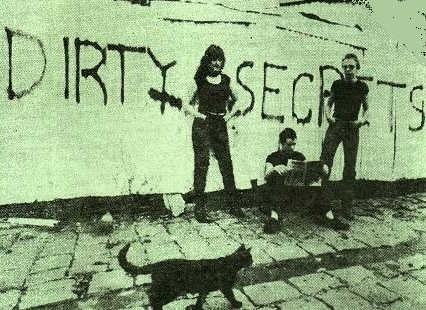 The band was called The News, they put out a few singles, which are collectors’ items among punks world wide now. Two weeks before I joined they did this single which was put out at the end of 77 in a paper bag, which had a fotocopy of a picture of an abortion on it, the song was called „Nobody wants me“. Like a very melodic choirboy meets The Ramones sort of style, but they changed their name a week before I joined in september 77.
The band was called The News, they put out a few singles, which are collectors’ items among punks world wide now. Two weeks before I joined they did this single which was put out at the end of 77 in a paper bag, which had a fotocopy of a picture of an abortion on it, the song was called „Nobody wants me“. Like a very melodic choirboy meets The Ramones sort of style, but they changed their name a week before I joined in september 77.
When you work on new tracks, what are the daily experiences that contribute most to it? What inspires and motivates you to start experimenting?
Well that really depends on how you feel in a situation of the day, you know, and what’s at hand. How you feel like and what equipment you have nearby at hand and where you’re doing it, the whole environment. So if you’re doing it in a room you don’t feel comfortable…
It might sound quite different then…
Yeah, it does sound different, but you might also be more agitated and so come up with something you’re quite as happy with in the end. But that’s different for each composer.
By the way, do you see yourself more as a composer or as an improviser, when it comes to creating new stuff? Or do you work in a way, that makes these terms obsolete?
Well it’s a combination of both I think, I never thought about that. In Last Dominion Lost, improvisation plays an important role, but we don’t overly improvise, otherwise it would be a free jam mess, and we do compose numbers. There is a room for improvisation, it’s the whole idea behind the whole thing when me and Jon and Julian interact.
Last Dominion Lost basically started as some loose studio sessions and from what I remember the material that was collected on “The Tyranny of Distance“ had been recorded before the name even existed.
That’s true, well, Jon and I and Dominic Guerin were together in SPK, they probably even more then me, and we recorded a whole lot of tracks at Dominic’s place in 1991 and 92. These tracks are what became the basis of „Tyranny of Distance“. It was never meant to come out under the name Last Dominion Lost, originally if there was going to be a name, it was going to be called Merge, which I think is a pretty mediocre name. Actually it was Klaus from Tesco, who kept going on at me about playing him this legendary lost post SPK tape, cause he’s an SPK fanatic. I told him about it and said it made a lot of work, some tracks were actually unuseful. I had the only copy which was a cassette copy, and I always thought of it as a shame, nothing had been done with it. Anyway, I paid for all the remastering in 2003, which cost me about 400 Euro to do it. We wiped away all the noise, which was a lot, cause we recorded it on a really bad tape. I put on the tracks that were usable, Jon was fine about it, he thought it was a good idea, but Dominic wasn’t happy, he thought I was ripping him off, which I had no intention of. When Klaus payed me royalty money and divided it into three, I didn’t take out the money I had spent for remastering.
Where does the title refer to?
The title comes from a book of the same name by Australian historian Geoffrey Blainey, it’s about how the tyranny of distance from Europe shaped Australia’s and New Zealand’s mentality and destiny as European nations cut up – essencially what they were and still are, that’s why I picked all the artwork, payed for all the art work, postcards and various pictures, Egyptian and Sumerian stuff, from the British Museum and transposed over a hand with vains sticking out. My friend Paul Roster did it, and it cost me another 200 Euro. I didn’t get any money back from that, but it was more my idea to put it out, cause I hate things sitting around doing nothing. And this was just too good to sit around, but Dominic was not happy with it.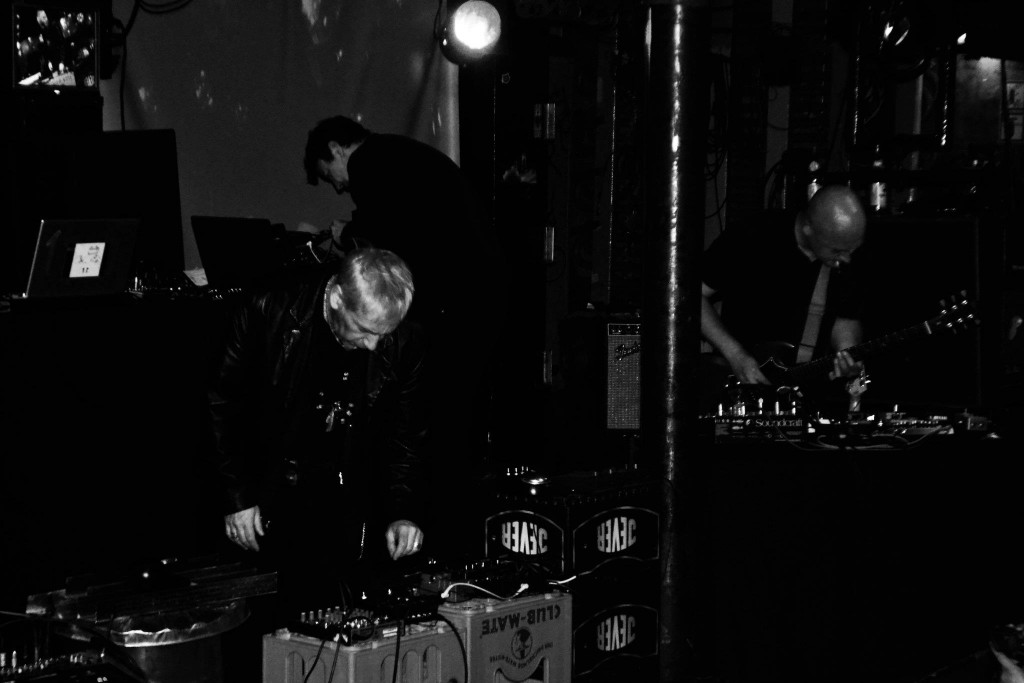
Cause he thought these were recordings from a closed chapter?
No, he just didn’t like the idea of it coming out, I don’t know, you would have to ask him, but he thought I was somehow claiming it was mine, and he thought I had secretly made lots of royalties from it.
Ok, some rather personal misunderstanding…
Yeah, I mean, we’re still friends and stuff, but he just didn’t understand, he is so out of myself and to a certain degree Jon and has no contact at all to people who are still doing that sort of stuff. He once made a half hearted attempt to contact a cassette label in America that he knew, but then that label no longer existed and he didn’t bother to keep up, and after that he just lost interest. And I was just determined to have it out, cause I don’t like very good things to get lost, and this had happened far too much in Australia paritcular. Maybe it’s the „mañana“ thing…
What’s that?
Mañana means the Spanish idea of doing it all tomorrow, some hot weather sort of laziness. Which is quite typical for Australia, actually, we’re a very lazy country. Klaus Hilger of Tesco showed interest, whithout him we probably would have never got it out. And he kept going on, he just wanted to hear that tape. I played it to him and he still wanted to put it out. Dominic actually benefitted from it, he had some of his old Twin Vision, which was the video arm of SPK, re-released by Tesco, which wouldn’t have happened without „Tyranny of Distance“ coming out. It wasn’t a very good seller, one of the worst sellers on Tesco, but I’m glad it came out. I wanted it there as a historical document.
Now for the last couple of years Last Dominion Lost has been a “proper“ band. To what extent did that influence the writing and recording (process) of your excellent new album? What is it like to write and record together?
Well that came together over a couple of years, we did rehearse regularly, we were often at NK and were recording there until 6 in the morning, all live and doing stuff, and I really love recording that goes well. We did a lot of stuff, most of that material is from the last 2 years, pieces we worked out in various improvised form. We played live in the studio, I’m doing my sampling and drumming and looping, Jon is doing his laptop and also playing with MS-20 and Julian always used various new stringed instruments. It was like semi-live actually, some of the tracks just came together, somehow fell to earth and we just polished them up with various overdubs. The basis was sometimes laborious, but at other times it came together surprisingly quickly, just 10-20 minutes or something.
The songs on “Towers of Silence“ relate to religion (ancient burial places, Buddhist rituals) but also to contemporary phenomena like killers. What can you tell us about some of the concepts behind “Towers of Silence“?
Well, I was not entirely involved with all that. We liked the pictures of religious stuff Jon and Julian came up with, I have my own spiritualty, which is kind of a Buddhist Gnostic thing, but we were looking in various books and images. The words I sing are really simple, cause I can’t really sing and drum properly at the same time, but they came together like falling out of the ether, referring to Zoroastrian sky burials, Tibeten sky burials and variouos things like that, but there is no over all massive text concept, there was just that influence of ritualism from this various religions. There is a piece on the album, which we thought is rather fine about the South Eastern version of NATO, which is called S.E.A.T.O., like the track. Well that came about purely by the fact that we were in Julian’s room, where we recorded late one night. Jon was looking in the internet about the history of S.E.A.T.O. and once said „why don’t we use the most rediculous words ever used in an industrial noisy band, pointless stuff?“ Essentially we just used some phrases from Wikipedia I think, you would have to ask Jon. The hisory of this S.E.A.T.O. I just kept repeating „S.E.A.T.O.“ and Jon threw in words about this organization that basicly died right after the Vietnam war, unlike NATO, so yesterday’s news. Most ridiculous topic we could sing about, even thought it’s an interesting topic.
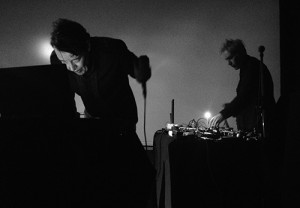 Another of your more recent projects is The Grimsel Path, which alludes to a track on the Last Dominion Lost-debut…
Another of your more recent projects is The Grimsel Path, which alludes to a track on the Last Dominion Lost-debut…
Yes, that’s where it’s named after. People come and ask me where the name came from.
I think there is a Street in London with that name…
Yeah, the rehearsal was in South London, in the studio that KnifeLadder ran, just around the corner from that path which was called The Grimsel Path, and I thought it’s a funny name.
I don’t know what „Grimsel“ means actually..
Grimsel dates back centuries, probably meant „scary path“. I always liked it as a name, so when Jon came up with this thing while Julian was back to Australia for a month, we used it. We did a Grimsel Path performance two years ago in Lichtenberg which went quite well, I always wanted to do it again, we had a slightly different sound than Last Dominion Lost.
Is The Grimsel Path solely meant to be a project that perfoms live or are there plans to record something?
We would like to record something. We had some offers to do things. But I can’t do anything until I’m better, you know, I would enjoy doing it.
What is in your eyes the main difference between Last Dominion Lost and The Grimsel Path?
I think there’s a sound difference, a very significant one, they are both basically electronic, both sort of shattering, pushing up against the wall, but they’re quite different. They’re not meant to be the same, they’re meant just diffent things. I’m using more of the accoustic laptop in Last Dominion Lost. Grimsel Path use boxes. I came to NK one night last year and there was this Norwegian guy who uses to live on the Canary Islands, who made boxes, which he put little things into that you can make noise with. Concert mike and stuff. If you amplify it it’s getting really loud. Earshattering!
Krank (in all its different spellings and incarnations) is a project of yours that goes back a long time. What led you to resurrect it and what role do the people play that contribute(d) to recordings?
Krank was originally called Krang, but then in the 90s in Australia I just fiddled around with the name. There was a dance band who called themselves Krang, so I first called it Krang Music. I put out a casette under that name in 1981, which sold quite well. It was all extreme white noise and sounded like „Metal Machine Music“ in three different tracks. I did other Krang Music tracks for various early compilations up until the end of 1983. By the time I was also playing with SPK. Just got a bit fed up by repeating myself with genre and stuff, and so when I did a life performance in Sydney it had a lot of ritualistic elements in it, Tibetan thigh bone and stuff, so I changed the spelling, I think I put the “g” at the front of it. One day I released it and have to get the tape back again.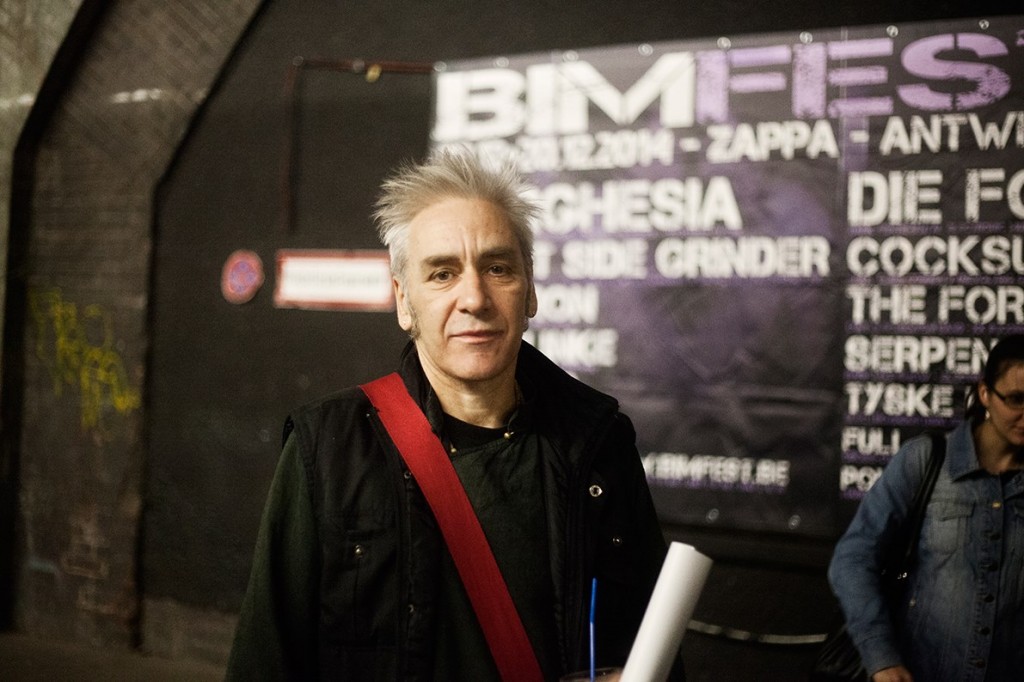
What other activities were you involved in at that time?
I did a lot of different stuff that time, commercial stuff, I worked as a session drummer. But also I had a band with Ollie Olsen called Orchestra of Skin and Bone. There were various incarnations of it in the time when I came back into more industrial. In a live review in an Australian newspaper someone said it’s a bit like SPK, except more ritual and primeval, which was sort of true. Bit schizophrenic in the sense of sound from warped EBM to this long weird drones and metal stuff. When we were good we were very good! When the album came out we sounded a bit different like the early incarnation, we had a lot of tape loops that I made up and sent back to Ollie from Britain. I and he broke it in 1986, he didn’t want to do it any more. I had a Krank release in America at the same time, I did the soundtrack of „Lines of Least Resistance“, which was a video that came out by a guy called Andrew Hickinbotham, on SPK’s video label. There was an original soundtrack which was different. Without my knowledge I had my Krank material in the soundtrack, which was put together by this Australian guy Roger Richards, who had taken over Extreme Records and sold it to a label called Silent Records. And he put out lots of tapes like Krank or different things with drums for MAX Q, a commerical band with Michael Hutchence and also Ollie Olsen. There were a lot of different acts going on in Melbourne, the thing that Stefan (of Anemone Tube) found on Youtube, we did with Ophiolatria. Stefan wants me to do it on the next Epicurean thing.
I also remember that there were plans to record a whole Shining Vril-album. Is that still something that is about to happen?
Well not now but I mean I will, this will all depend on health. Im not in a great hurry, probably may try and put toghether all the various tracks that are on compilations and put that out.
Could you also say what happened to KnifeLadder?
Well that’s a story of its own. It’s a work in progress, technically, its on a stand-by, a hiatus. We talked about doing more recordings one day. Andrew’s main project is now Black Light Ascension, but he would like. Hunter definitely wants to put out pieces we recorded and that never saw the light of day. Theres a lot of stuff I would like to come out, even if its just on soundcloud, but it’s too good to just sit around. But Andrew has facilitated about that. Sometimes he is very enthusiastic, but sometimes he doesn’t want these pieces to be heard by many people. I don’t know, we never broke up, we never parted, it just sort of stopped. Some of the ideas that I had acually moved into Last Dominion Lost.
You do a lot of live drumming for several acoustic folk and neofolk bands, one collaboration I really admire is your work with Andrew King. Do you regards these things as a separate chapter of it’s own?
Again it depends on who it is. Andrew pays well. I dont think of these things as completey separated. I’ve got Andrew for instance to work on my own projects, doing vocals. He’s possibly doing vocals on a future Last Dominion Lost track, actually he would like to appear on one of the tracks on the Last Dominion Lost album. He waits to see if we can make room to take the vocal of, he got one where he has his voice on the top of a different track, he can get this possibly released on a label in America, and we all said fine, but he can’t do it until he’s finished his PHD. So I don’t view things as seperate or as divided departments of their own. In the past it was the same with Foresta di Ferro. I enjoyed working with Marco I just provided him some sounds and left it all up to him. We did do most of that in a recording studio in London in 2002, when Marco lived near London. I sold him my sounds on an old fashioned cassette tape, and said “do what you want, treat it, put it completely different, just make sure my name is printed.” He would do that, that was my contribution, we were in the same town, we had an afternoon to record. It was the same with the other Australian guy, Richard Leviathan. Marco was in a studio once with him, he recorded some guitar and Marco built stuff around that.
Some years ago you mentioned in an interview how important German electronic music was for your musical development. It seems that there are more American/Bristish artists who cite such music as influence than German ones (it says that a prophet is not without honor, save in his own country). Could you briefly tell us what it was in that music that made it so special (for you)?
As to groups of the pre-punk era, the early Cluster, Tangerine Dream, Faust, Can, Magma from France, well they had a wordwide influence and I’m not sure if Germans really ever quite understood.
Its not as appreciated as it should be.
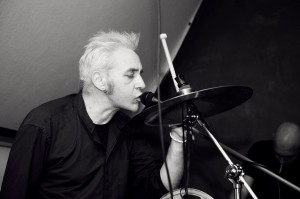 It’s appreciated far more in the English speaking world where those bands became quite popular. Tangerine Dream for example toured in Australia in 1975, where they had an audience, I didn’t go, cause I had to be at school, and well, I was introduced to all that music by a record shop hometown, run by that crazy Sudeten German. Well, you went in to buy something and walk out 3 hours later with all these kraut rock music records, he made you buy, a notorious guy called Daniel. And Graham from SPK used to fly over from New Zealand, where he originally came from, to buy stuff from this shop. They had a large selection of everything German and Austrian, a lot of rubbish as well as great stuff. Terrible metal bands from here like the one called Jane. And also had a large import section of records you can’t get anywhere else. Not just German, but stuff like obscure American or European things, Italian prog releases, Goblin stuff. You couldn’t find the Velvets’ album „White Light, White Heat“ anywhere, but you could buy it there in original pressings. I heard all the kraut and cosmic music there, and I remember that I didn’t immediately get warm to it, but I never heard anything like Ash Ra Temple before, pretty amazing stuff. Hadn’t heard anything like Faust before, it just balled me over. All of these bands, Can for instance, were a lot bigger in Britain.
It’s appreciated far more in the English speaking world where those bands became quite popular. Tangerine Dream for example toured in Australia in 1975, where they had an audience, I didn’t go, cause I had to be at school, and well, I was introduced to all that music by a record shop hometown, run by that crazy Sudeten German. Well, you went in to buy something and walk out 3 hours later with all these kraut rock music records, he made you buy, a notorious guy called Daniel. And Graham from SPK used to fly over from New Zealand, where he originally came from, to buy stuff from this shop. They had a large selection of everything German and Austrian, a lot of rubbish as well as great stuff. Terrible metal bands from here like the one called Jane. And also had a large import section of records you can’t get anywhere else. Not just German, but stuff like obscure American or European things, Italian prog releases, Goblin stuff. You couldn’t find the Velvets’ album „White Light, White Heat“ anywhere, but you could buy it there in original pressings. I heard all the kraut and cosmic music there, and I remember that I didn’t immediately get warm to it, but I never heard anything like Ash Ra Temple before, pretty amazing stuff. Hadn’t heard anything like Faust before, it just balled me over. All of these bands, Can for instance, were a lot bigger in Britain.
Faust were on Virgin for instance..
Yes, I had that records, it was a big influence.
Nowadays it seems that a band like Kraftwerk is more a part of our cultural heritage. How do you feel when you think about the performances where they perform their backcatalogue in museums, art spaces etc.?
You know, I don’t really have an opinion about if it’s good that they’re doing it, well, but it is good that they lasted all that time. I admired them, but I’m not a fan of everything they’d done, I actually prefer the very early Kraftwerk, when they were more flexible, haha, I loved „Man Machine“. In that period all their stuff was great, I saw them play in London in 1981 which was extremely good. I love the imagery and all that, but I’ve never been a massive fan. Germans should be proud of them, I always admired the music and the way they looked, they were a prototype of much which came afterwards, though of not so many good people. Great show as I saw them, and they had humour. Especially at the end the one called Wolfgang Flür, who’s not in the band anymore, did all the funny faces behind the curtain. You dont have to be poe faced, as we say, serious. Douglas from Death In June saw Kraftwerk when they did a 5 night residency at Sydney Opera House, six months ago or something. I think he went most nights, he loves them all, the setting and stuff. They did play even some of the early stuff. He said to me it was briliant. You can’t have a band like that from America, I suppose.
What do you think makes them so typical for this country?
Difficult one I suppose, foreigners point at you, saying you’re very humorless and tend to efficiancy, which isn’t really true, certainly not in the hospital I was in, it was rather the opposite. Kraftwerk play with that, I think, and some of the more gullible people in the English speaking world slap that up, take it serious, but there’s a hidden humour in Kraftwerk, some people don’t get and don’t want to get that. Especially the English speaking bands, cause they want Kraftwerk to conform to a Germanic stereotype, if you understand what I mean..
I think so..
Also not very humourous in a certain way, the people in Britian. Bands I’m talking about, they wanted them to be stiff and scientific, as they of cause referred to themselves like musical scientists. Kraftwork were a gift from heaven for those people. That’s all I can say, I love them, long may they reign!
What’s the next things on your schedule?
Well I’m not realy envolved in anything, cause I’m recovering. But well, we’ll slowly record the next Last Dominion Lost album, I’m planning what to do for the next Krank album, we like to do a proper album, a vinyl one, besides that I think about doing some more Shining Vril stuff, and try an approach from a different angle. All these things will be slow processes. Everyone I know knows that I’m very sick and I said if you want me to participate, then you have to do it around what I’m doing, that involves also Jason of The Walking Corpses. I said to him I can’t play with you live anymore. Recording sessions, but not live. One thing else Annie and I had talked about is about Krank with vocals and other instruments. I have to sort of riviving something we did in Lichtenberg some three years ago, she did percussion, playing the bongos in a very simple pulse, which was very effective, and I put a slight delay on my kaos pad and produced this. One other thing are my recent hospital experiences, they inspire me to do an electronic album, which Till of Gerechtigkeits Liga will help me out with. I would use the sounds of this breathing device and combine them with sounds and demonic voices. I have a title, „The Abomination of Desolation“, referring to the way I felt the early days I’ve been in hospital. That might take a while, maybe I’ll never do it, well, but it could be a good idea, I might put it out as a companion thing to a Krank record. It was a very confronting experience I had in hospital. I had always halluszinations while I was in the coma for 12 days. Some of that might appear in this recording. Annie appeared to me in a lucid dreams, where I heard her. Nikolas Schreck and I might as well do some more works together in the future. But the thing with Annie’s voice, we should try and reproduce that, Stefan thought it was a very good idea. For my own memory, nothing to get on the top of something.
(M.G. & U.S.)
Fotos: Karolina Urbaniak, Laura Fusato & The Epicurean
